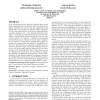Free Online Productivity Tools
i2Speak
i2Symbol
i2OCR
iTex2Img
iWeb2Print
iWeb2Shot
i2Type
iPdf2Split
iPdf2Merge
i2Bopomofo
i2Arabic
i2Style
i2Image
i2PDF
iLatex2Rtf
Sci2ools
134
click to vote
GECCO
2006
Springer
2006
Springer
How an optimal observer can collapse the search space
Many metaheuristics have difficulty exploring their search space comprehensively. Exploration time and efficiency are highly dependent on the size and the ruggedness of the search space. For instance, the Simple Genetic Algorithm (SGA) is not totally suited to traverse very large landscapes, especially deceptive ones. The approach introduced here aims at improving the exploration process of the SGA by adding a second search process through the way the solutions are coded. An "observer" is defined as each possible encoding that aims at reducing the search space. Adequacy of one observer is computed by applying this specific encoding and evaluating how this observer is beneficial for the SGA run. The observers are trained for a specific time by a second evolutionary stage. During the evolution of the observers, the most suitable observer helps the SGA to find a solution to the tackled problem faster. These observers aim at collapsing the search space and smoothing its ruggedne...
Related Content
| Added | 23 Aug 2010 |
| Updated | 23 Aug 2010 |
| Type | Conference |
| Year | 2006 |
| Where | GECCO |
| Authors | Christophe Philemotte, Hugues Bersini |
Comments (0)

